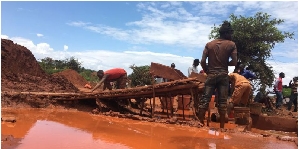 There is increasing evidence that many children who are trafficked to work at small mining sites
There is increasing evidence that many children who are trafficked to work at small mining sites
The Anti-Trafficking in Persons Secretariat (ATS) in the Ministry of Home Affairs is intensifying a crackdown on all forms of exploitation, particularly human trafficking, a top official in the office has said.
The government’s remarks come in reaction to a shocking revelation following The Citizen’s investigation that uncovered alarming levels of human trafficking and exploitation of underage individuals in the resource-rich districts of Kahama and Geita in the Shinyanga Region.
ATS secretary, Mr Seperatus Fella, has attributed the increasing levels of inhuman acts to the lack of education among citizens on the severe consequences of the practice.
He underscored the crucial role of local government authorities in curbing oppressive acts.
“We found out that many people don’t understand, but after educating them about what the law says and punishments, people started to understand a little.”
Mr Fella admitted the existence of local government leaders who were inadvertently facilitating trafficking and stressed the need for a regional education campaign in the remote areas of districts like Geita and Kahama and border regions.
Aware of the exploitation of children on tobacco farms and communities, the secretariat says it is developing a comprehensive plan to provide education, starting at the local government level.
The initiative aims to prevent victims from integrating into communities while still young, thereby safeguarding national security.
Mr Fella highlighted the shift in focus from punitive measures to enhancing understanding within communities, leveraging the unique advantage of local government leaders familiar with their communities to reach every doorstep.
New initiative formed
Mr Fella said they were collaborating with the immigration department and anti-trafficking NGOs as part of new efforts to dismantle the syndicate involved in the illegal business.
The efforts include the recent launch of the Tanzania Network Against Human Trafficking (TANAHUT) last year. TANAHUT, a coalition of about 105 organisations, including NGOs, universities, and media organisations, aims to enhance counter-trafficking activities in Tanzania.
A human rights activist, Mr Ayub Mrosso, expressed optimism about the joint initiative, saying: “Actually, these things have existed substantially in the country, but the steps taken by the government and the stakeholders to join forces are an indicator of success.”
The U.S. 2022 Trafficking in Persons Report acknowledges Tanzania’s significant strides in eliminating the crime but notes that the nation does not fully meet the minimum standards required.
While more traffickers were convicted in 2022, lenient sentencing weakened deterrence and did not adequately address the nature of the crimes.
TANAHUT’s chairperson, Mr Edwin Mugambila, stressed the need for concerted efforts. “[TANAHUT] allows us to work collectively to end the scourge of trafficking in persons,” he says.
During the launch of the coalition, network members were reported to have applauded the efforts of authorities in combating trafficking, expressing hope that continued commitment would lead to the eradication of the crime.
The efforts include investigating more trafficking cases, convicting more traffickers, identifying more victims, and coordinating with local and international organisations to enhance training for government officials.
Mr Mrosso believes that TANAHUT’s presence will bring about a significant revolution, increasing the collective power and resources to fight human trafficking.
“These things exist on an enormous scale; they start in villages, but the education that will be provided through TANAHUT will help to change the situation,” he stated.
The executive director of a Shinyanga-based NGO, Ms Lydia Agostino, revealed that a comprehensive plan was being prepared to eradicate child exploitation at its roots. Despite financial constraints, Ms Agostino expressed optimism about collaborative efforts with authorities, highlighting the importance of rescuing victims, providing rehabilitation, and raising awareness within communities.
“The efforts we are making in collaboration with authorities, although it is an uphill task, provide a brighter future for the girls in the exploitative cycle,” he said.
NGOs and grassroots activists, while acknowledging their crucial role in the battle against human trafficking, underscored the need for financial support to strengthen their impact.
They appeal to both local and international governments to provide resources to the organisations so they can carry out vital missions effectively.
Experts in the field agree that a comprehensive approach involving education, strict law enforcement, and collaborative efforts between government agencies and NGOs is key to eradicating child exploitation.
An expert in psychology, Dr Moses Nguye, emphasised the lack of funds for gender and child desks in the police force and social welfare officers as a challenge that needs to be addressed.
“Serious NGOs and social welfare desks in these border districts need to be economically empowered because they are dealing with a very dangerous and economically stable network,” he said.
“The United Front aims at sealing trafficking channels and protect vulnerable children, setting an example for the world in the fight against this heinous crime,” Ms Agustino said.